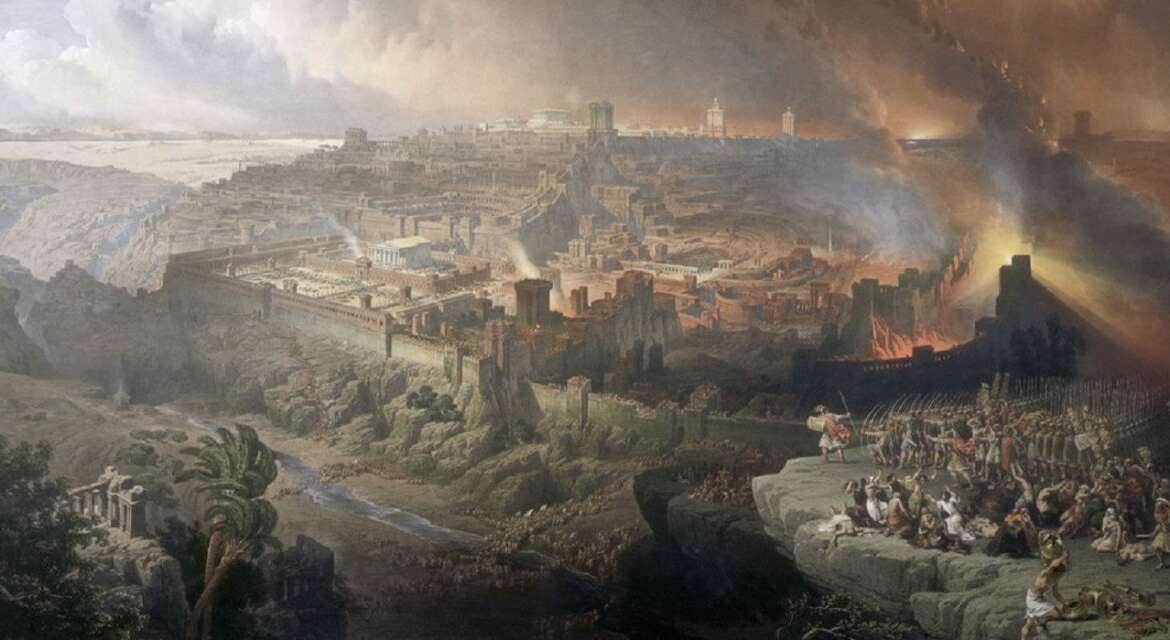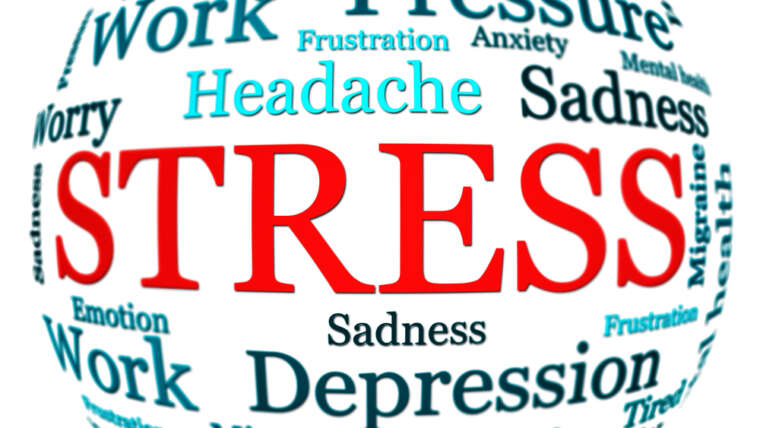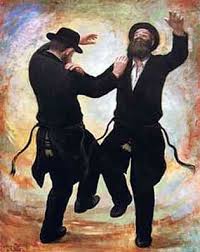From our friends at Chabad:
18 Tisha B’Av Facts Every Jew Should Know

1. Tisha B’Av Is the Saddest Day of the Jewish Calendar
Tisha B’Av, the 9th day of the month of Av (Aug. 10-11, 2019), is the saddest day on the Jewish calendar. Referred to by the prophet as “the fourth [month] fast,”1 it is second in severity only to Yom Kippur, which is mandated in the Torah.
2. It Commemorates Several Tragic Events
Both Holy Temples in Jerusalem were destroyed on this date. The First Temple was burned by the Babylonians in 423 BCE and the Second Temple fell to the Romans in 70 CE, unleashing a period of suffering from which our nation has never fully recovered.
In fact, the tragedies of the 9th of Av predate the destruction of the Temples: this was the date upon which the spies returned from the Promised Land with frightening reports and the Israelites balked at the prospect of entering the land.
In 133 CE, the Bar Kochba revolt against the Romans ended in defeat. The Jews of Betar were butchered on the 9th of Av and the Temple Mount was plowed one year later on the same date.
Later on in our history, many more catastrophic events happened on this day, including the 1290 expulsion of England’s Jews and the 1492 banishment of all Jews from Spain.
Read: What Happened on the Ninth of Av?

3. It Comes After Three Weeks of Mourning
This fast is the culmination of a three-week mourning period, which began with the fast of 17 Tammuz, the anniversary of the breaching of the walls of Jerusalem. The final nine days(especially the week preceding 9 Av) are of an even greater measure of mourning, when no meat is eaten, clothing is not laundered and washing is minimized.
4. We Do Not Eat or Do Four Other Activities
As on all fast days, we neither eat nor drink. And as on Yom Kippur, we also eschew washing, applying lotions or cosmetics, wearing leather shoes and engaging in marital relations.
While pregnant and nursing women generally do not fast on the other rabbinic fast days, they do fast on 9 Av, provided that they can do so without endangering themselves or their child. Consult a competent Orthodox rabbi and your physician if you have any questions and/or specific medical concerns.

5. We Do Not Even Learn (Most Parts of the) Torah
“The commandments of G‑d are upright, causing the heart to rejoice,”2 said King David. For this reason, we may not study Torah on this sad day.
It is, however, permitted—and encouraged—to study sections of the Torah that discuss the laws of mourning, the destruction of the Temples, and the tragedies that befell the Jewish people throughout our history. This prohibition actually begins on the day before Tisha B’Avat midday.
6. We Eat a Meal Before the Fast Begins at Sundown
Like other Jewish holidays, Tisha B’Av begins at sundown on 8 Av and ends when the stars come out the following night.
In the final minutes before the fast, we eat a “separating meal” consisting of bread, egg (the quintessential mourning food) dipped in ash, and water. We eat this meal sitting on a low stool, alone, and each individual says Grace After Meals on his own.

7. It Often Begins on Saturday Night
Like the first day of Passover, 9 Av can occur on Shabbat, Sunday, Tuesday and Thursday. When it falls on Shabbat, it is delayed to Sunday. This means that approximately 40% of the time, it is observed on Sunday. 3
In this case, the “separating meal” is enjoyed in true Shabbat spirit, with a full array of Shabbat foods. Care must be taken, however, that this meal ends before sunset.
We sit on chairs of regular height and wear normal footwear until nightfall. Only washing, eating and drinking are prohibited starting at sunset.
8. We Read Eichah in Synagogue
The central element of synagogue services on the eve of Tisha B’Av is the mournful reading of Eichah (Lamentations), the sad prophecy of Jeremiah regarding the destruction of the First Temple in Jerusalem and the subsequent exile of our nation.
Much of this book is structured according to the Hebrew alphabet, as if the holy language itself is weeping for the destruction of G‑d’s home and the displacement of His nation.

9. We Don’t Sit on Regular Chairs
Like everyone else at the synagogue, the reader recites Eichah while sitting on a low stool (or overturned chair or bench). We continue to not sit on chairs of regular height until midday.
In another sign of mourning, the decorative curtain is removed from the Holy Ark.
10. In Some Synagogues Only Candles Are Lit
In some communities, the lights are dimmed and services are held by flickering candlelight. In the ancient Jewish community of Rome, the candles used this night were extinguished and then saved to be used on Chanukah, when they were placed in the menorah.

11. Even Tallit and Tefillin Are Pushed Off to Minchah
Morning services today are unique in that men wear neither tallit nor tefillin. They are an adornment, and we mourn bereft and unadorned. (They are worn instead during afternoon services.)
12. We Read Kinot, Elegies
Morning services are followed by several hours of reading Kinot, complexly structured Hebrew elegies that graphically describe the dreadfulness of the Roman pillage of Jerusalem, the brutality of the Crusades, and the many other horrors our nation has experienced for millennia. Some Kinot books may include compositions written after the Holocaust.

13. We Do Not Work on Tisha B’Av
While it is permitted to drive and do the other forms of “work” we do not do on Shabbat, it is forbidden to work in the more conventional sense of the word on this day. If you absolutely must work, delay it until after midday.
14. In The Afternoon We Are Gladder
After the halachic noon (when the sun is at its apex), the mourning restrictions are lifted somewhat. In addition to performing necessary work, we stop reading Kinot and begin to sit on regular chairs.

15. People Clean Up in Anticipation of Moshiach
There is a time-honored custom to clean up the home on Tisha B’Av afternoon in anticipation of the arrival of Moshiach, who will usher in the end of the long exile that began on this date two millennia ago.
16. It’s Called a “Holiday”
Somewhat surprisingly, we find that Scripture refers to 9 Av as a mo’ed,4 a term that means “holiday” or “special time,” because the very destruction was sown with the seeds for the future Redemption. Another cause for celebration: Although G‑d’s house was in ruins, His beloved people, the Jewish Nation, survived. For this reason, we do not say tachanun(prayers of repentance) or selichot (requests for forgiveness) during the prayer service.5
17. When the Fast Ends We Do Kiddush Levana
The fast ends at nightfall. Following evening services, it’s customary to perform Kiddush Levanah, the Sanctification of the Moon, which is said once a month during the first part of the lunar cycle. This is an appropriate activity to follow a day representing the waning (and subsequent waxing) of the Jewish people, who are compared to the moon.
If the weather isn’t cooperating and the moon is not clearly visible in the sky, don’t worry about it. You can say Kiddush Levanah until midmonth.

18. Don’t Eat Meat Until the Next Morning
After the fast, wash your hands and enjoy a dairy or pareve meal. Even though the fast is over, since the Holy Temple continued burning through the night and into the following day, the restrictions of the preceding nine days (such as not eating meat, swimming or laundering clothing) extend until midday of the 10th of Av.



